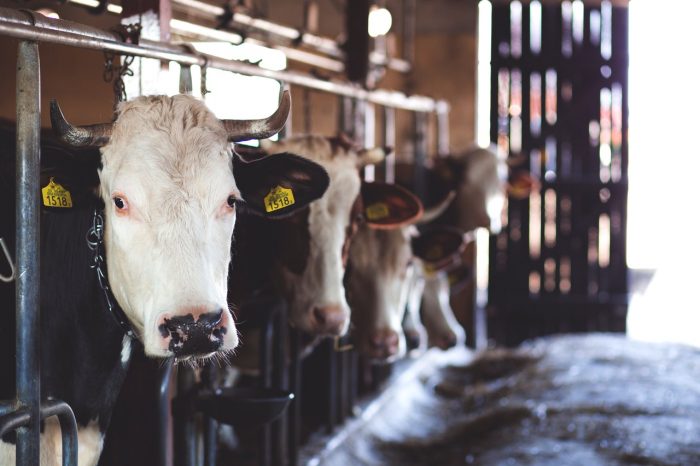Have you ever stopped to think about what you are eating when you bite into a big juicy burger or cutting into your steak?
It’s flesh—pure and simple. It’s the cooked flesh of what used to be a living creature who was massacred for humans eating pleasure. I say pleasure because it has been proven time and time again that humans don’t need meat to survive as a species.
When ingesting meat (flesh) of a cow or pig or whatever other animal we kindly call another name to make it seem less real, we are choosing death over life. Studies have shown that the meat of these animals causes heart disease and can lead to high cholesterol and blood pressure, but we continue to pound our hot dogs because that’s what’s been done for generations.
Remember when they thought smoking was healthy as a diet aid? Remember when they lied to us and said cigarettes don’t cause cancer? We are also being lied to by the meat and dairy industries.
They want our money and they want to produce more and more of a profit so they squeeze as many cows, pigs, and chickens into the factory farm. It’s an inhumane practice.
Here are 11 facts according to “Do Something” about factory farms that may alarm you:
1. A “factory farm” is an extensive industrial operation that houses animals raised for food and treats them with hormones and antibiotics to stop disease.
2. Factory farms feed animals corn, wheat, and soy that contain big amounts of pesticides, which are passed on to the people who eat them, creating serious health issues in their bodies.
3. The beaks of chickens, turkeys, and ducks are often removed in factory farms to reduce the excessive feather pecking seen among stressed birds.
4. A typical supermarket chicken today contains more fat and less protein than 40 years ago.
5. Two in three farm animals are now factory farmed.
6. Confining animals in one place produces a lot of waste.
7. The pollution from animal waste causes many health problems, even death for people who live near factory farms.
8. Dairy cows typically live to their third lactation before being culled. Naturally, a cow can live for 20 years.
9. Hog, chicken, and cattle waste has polluted 35,000 miles of rivers in 22 states and contaminated groundwater in 17 states.
10. Egg-laying hens are sometimes starved for up to 14 days, exposed to changing light patterns, and given no water in order to shock their bodies into molting.
11. Worldwide, about 70 billion farm animals are now reared for food each year.
I think we should start calling meat by what it is so that an image of that sweet pig comes up in our minds when speaking about bacon, pork, ham, or sausage. It’s all pig that is being ingested.
I hear people so excited about making a “roast”—it’s not a roast, it’s a cow.
A quick Google search gave me this result:
What part of the cow is roast beef?
“Consisting of parts of the neck, shoulder blade, and upper arm, beef chuck produces tough but very flavorful cuts of meat. This primal cut has a good deal of connective tissue.”
Cow butt anyone?
“The cow’s entire hind leg (which includes the butt, ham, and thigh) is known as the beef round. Round roasts, steaks, and the London broil all come from this area, as do sirloin tip roast and sirloin tip center steak.”
Factory farming is killing the environment. Animals are being brutally murdered while our obesity rate in the United States is skyrocketing.
The United States adult obesity rate stands at 42.4 percent (the first time the national rate has passed the 40 percent mark, and further evidence of the country’s obesity crisis). The national adult obesity rate has increased by 26 percent since 2008.
Heart disease is the number one cause of death in our country.
Number of deaths per year: 635,260
Percent of total deaths: 23.1 percent
More common among:
>> Men
>> People who smoke
>> People who are overweight or obese
>> People with a family history of heart disease or heart attack
>> People over age 55
What causes heart disease?
Heart disease is a term used to describe a range of conditions that affect your heart and blood vessels. These conditions include:
>> Heart arrhythmias (irregular heartbeats)
>> Coronary artery disease (blocked arteries)
>> Heart defects
Tips for Prevention
Lifestyle changes can prevent many cases of heart disease, such as the following:
- Quit smoking. Here are some apps to help you.
- Eat a healthier diet.
- Exercise at least 30 minutes per day, five days a week.
- Maintain a healthy weight.
They won’t right away tell you that meat is contributing to heart disease because then the doctors won’t receive the government subsidies, but I recommend doing some research. I recommend the documentary, “What the Health,” which goes into specifics about this issue.
I dare anyone to watch one Tabitha Brown video and not turn instantly vegan or want to give it a try.
I don’t mean to come off harsh or brash, but we don’t have time to change the trajectory of our planet. We need to all get on board to make small, simple changes to save the lives of animals and our planet.
If we truly want to live a mindful, harm-free, contemplative, compassionate life, it begins on our plate. We can’t continue eating medicated, diseased animals and live at a high vibration. We want life energy coursing through our veins, not the energy of fear and death like what the animals of our planet go through before slaughter.
I am always happy to talk about veganism and what it means for health and well-being and how it can help our planet. I believe if people knew what specifically they were ingesting, they wouldn’t be able to consume it.
We are smart people, but we’ve been brainwashed by an industry that has told us and our parents that milk does a body good and we need meat for the protein. This is a bald-faced lie, and we need to wake up.
~







Read 15 comments and reply